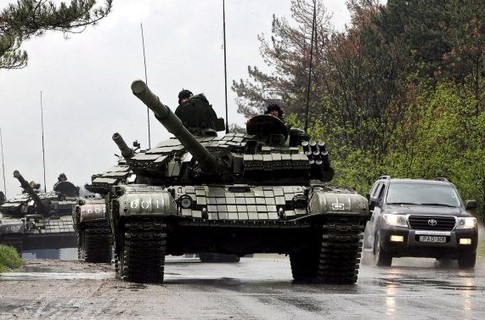Residents of Rio de Janeiro were perplexed Thursday as they watched, live on television, the movements of hundreds of armed gang members getting ready for a clash with police, dpa reported.
The powerful Brazilian television network Globo broadcast footage taken at midday from a helicopter ahead of a major police raid on two local slums, known as favelas.
The footage showed alleged gangs in the favela Vila Cruzeiro carrying heavy weapons as they moved through the forest towards the nearby slum Complexo do Alemao. They were reportedly planning to join local criminals there in order to fight police together.
Also Thursday, police enlisted six Brazilian army tanks to back up their attempt to occupy these two slums.
Rio de Janeiro is set to host several matches of the 2014 football World Cup, including the final, as well as the 2016 Olympics, the first ever held in South America.
Initial skirmishes between alleged criminals and police were minor. Some suspects fell to the ground as they attempted to escape, injured by bullets shot by police, but the real clash was still believed to be coming. It remained uncertain whether it would indeed take place or whether the drug gangs would opt to disband instead.
The televised movements marked a new chapter in the atmosphere of tension that took over the city on Sunday, when criminals launched a wave of arson attacks on buses and other vehicles around the city.
Local authorities interpreted the wave of attacks as revenge for a new public security policy, which aims to push drug gangs out of the favelas through a combination of police action and social welfare programmes.
The Rio de Janeiro state government and its Public Security Minister Jose Mariano Beltrame have also increased the pressure on drug gang leaders in prison. Many have been transferred to maximum- security jails in the southern Brazilian state of Parana and the Amazonian state of Rondonia.
Although 17,500 police officers have been deployed on the streets with backing from the Army, guerrilla attacks continued Thursday for the fifth consecutive day. A total of 55 vehicles have been set on fire across the city since Sunday.
Clashes between police and the drug gangs have claimed at least 23 lives over these five days, police said. Unconfirmed reports put the death toll at 27.
At least 21 people were have also been treated in hospital since Wednesday for bullet and grenade wounds.
While Rio de Janeiro Governor Sergio Cabral has insisted people should remain calm and go about their daily business, the wave of violence has inevitably affected the lives of cariocas, as Rio's residents are known.
At least 4,000 children and teenagers were left without class Thursday as police prepared a raid on the slums where they live. Several public transportation companies decided to cancel bus services in the face of arson attacks.
Fear was especially apparent in the affected favelas. According to the Namko van Buuren, a Dutchman who heads the Brazilian Institute of Social Health Innovations (Ibiss), residents of Vila Cruzeiro are afraid to leave their homes.
"They are trying to hide behind the concrete of their homes for fear of stray bullets," Van Buuren told the website UOL.
Ibiss helps about 5,400 children daily in Vila Cruzeiro.
In this favela, 14-year-old Rosangela Alves on Wednesday became the first victim of the conflict with no ties to drug trafficking. She was struck by a bullet as she did her homework on a computer, inside what should have been the safety of her own home.
A day after her death, the drug gangs left Vila Cruzeiro for the Complexo do Alemao, which many fear could become the site of a bloodbath in the drawn-out conflict between police and organized crime in Rio.






